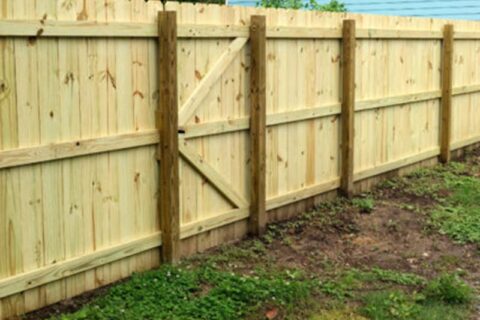7 Things to Consider for Your New Fencing Project
You’re thinking about taking on a fencing project. However, seeing as you’ve never installed a fence before, you don’t have the slightest idea as to what it might entail.
That’s why you’re reading this article: you need help. Fortunately, we can provide it to you. Without further ado, here are 7 things to consider for your new fencing project.
1. There Are Many Different Materials to Choose From
First and foremost, you should know that there are many different materials to choose from. You don’t have to stick with a wood or chain link fence, for instance. You also have the option of vinyl or composite or wrought iron or steel.
Each fencing material provides different benefits and drawbacks. Some are much more durable than others; some require much more maintenance; some are good for privacy and/or security; others are bad for privacy and/or security.
Do your due diligence and ensure that you’re choosing the material that’s right for your project. Fences last for a minimum of about 20 years. You don’t want to install one just to tear it down a few years down the road.
2. Costs Can Vary Wildly
Another thing you should consider about your fence project is that costs can vary wildly. The cost to fence a yard is highly dependent on the type of material you use.
Chain link fencing is generally the cheapest. Wrought iron and steel fencing are generally the most expensive. Wood, vinyl, and composite fall somewhere in the middle of the spectrum.
Before starting your project, you’re going to want to create a detailed budget. This way, you’ll know which materials are in your wheelhouse, and how much wiggle room you’ll have in the event of a screw-up.
3. Your Yard Might Not Be Your Yard
You’ve lived in your house for years. You know exactly where your yard ends and your neighbor’s yard begins . . . or do you?
The truth is that you might not know this as well as you think you do. Your neighbor’s yard could extend farther into yours than you realize. This can be problematic when a fence is being erected.
As such, before beginning your project, you need to be 100% certain that you aren’t encroaching on your neighbor’s property. For help in accomplishing this, click this link.
4. Maintenance Matters
Simply put, some materials are tougher than others. As such, they require much less maintenance over the years. And when a fence material requires less maintenance, it requires not only a smaller time commitment but a smaller money commitment as well.
Wood fencing is, by far, the most maintenance-needy material in existence. It needs to be sealed and stained every 3 to 5 years. On the other end of the spectrum are composite and vinyl, which really only need to be cleaned from time to time.
Steel, wrought iron, and chain-link exist in the middle of the spectrum. They all have the capability to rust, and therefore need to be de-rusted from time to time.
In essence, consider the amount of maintenance you want to deal with before choosing your material.
5. There Are Many Different Styles Possible
Not all fences are constructed in the same way. Whereas some are opaque in nature, others leave large gaps between their individual posts. And whereas some stand at 4 feet tall, others stand at 6 feet tall or even 10 feet tall.
In short, there are many different styles of fences available to you. You don’t have to settle for the most common look.
Do some research and find a fence that suits your preferences and needs. If you’re looking for ideas, ask your local fencing company. They’re sure to have a bevy of front yard fence ideas for you to consider.
6. There Could Be Electrical Wires Where Your Fence Is Going
Depending on where you live, there could be electrical wires buried in your yard. As you might expect, these wires can become a problem when it’s time to install a fence.
For this reason, before digging any holes, you need to ensure that you’re far away from any electrical wires. Should you strike one of these wires with a shovel, you could turn off the power in your home, cause injury (or death) to yourself, or both.
Fortunately, there’s a number you can call to determine where electrical wires are buried. That number is 811. Call it up, schedule an inspection appointment and be 100% certain of what you’re going to encounter when you sink your shovel into the soil.
7. Fence Installation Is Tougher Than It Looks
You might look at a fence and think that fence installation would be easy. You just stick posts into the ground, right?
Well, that’s certainly one aspect of it. However, you can’t just put those posts in the ground without preparation. You must ensure that they’re level, ensure that they’re buried at the right distance, and much, much more.
Put simply: if you’ve never installed a fence before, you’re likely going to have some trouble with it. For this reason, instead of installing a fence yourself, you should consider handing the task off to a seasoned professional.
Professional fence installation companies are well-versed in the installation of all kinds of fences. They’ll ensure that your fence is installed the right way, saving you tons of time, money, and grief in the process.
Need Help With Your New Fencing Project
Do you need assistance with your new fencing project? If so, you’re in the right place. We here at Florida State Fence can help.
We’re the premier fencing company in Florida and have implemented new fence ideas for a bevy of the state’s homeowners. Regardless of the type of fence that you’re looking to install, our skilled and experienced team can help you.
Contact us now to discuss your needs!


